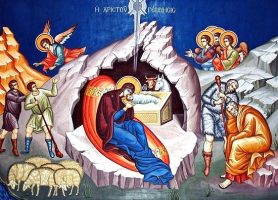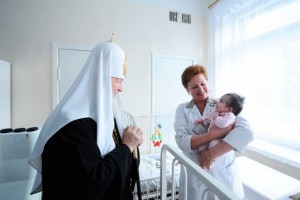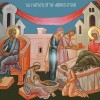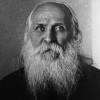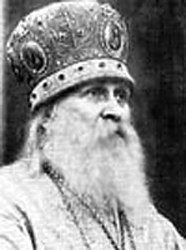 Vladyka Benjamin was one of the best-known ecclesiastical writers of the twentieth century. He was born in the Kirsanov district of the Tambov province. In 1907, after having completed the Tambov Seminary and the St. Petersburg Theological Academy, he was ordained a hieromonk. From 1911 to 1917 he was the Rector of first the Taurida and then the Tver Seminaries and was elevated to the rank of archimandrite. From 1925 to 1927 and from 1929 to 1931 he was an instructor at the St. Serge Theological Institute in Paris. From 1927 onward he was a clergyman of the Moscow Patriarchate, and in 1933 became the Patriarchal Exarch in America. In 1938 he was elevated to the rank of metropolitan. After his final return to Russia in 1947 he headed the Diocese of Riga and Latvia and served in Rostov-on-Don and Saratov. He spent the last years of his life in retirement in the Pskov-Caves Monastery, in the caves of which he was buried after his repose in 1961.
Vladyka Benjamin was one of the best-known ecclesiastical writers of the twentieth century. He was born in the Kirsanov district of the Tambov province. In 1907, after having completed the Tambov Seminary and the St. Petersburg Theological Academy, he was ordained a hieromonk. From 1911 to 1917 he was the Rector of first the Taurida and then the Tver Seminaries and was elevated to the rank of archimandrite. From 1925 to 1927 and from 1929 to 1931 he was an instructor at the St. Serge Theological Institute in Paris. From 1927 onward he was a clergyman of the Moscow Patriarchate, and in 1933 became the Patriarchal Exarch in America. In 1938 he was elevated to the rank of metropolitan. After his final return to Russia in 1947 he headed the Diocese of Riga and Latvia and served in Rostov-on-Don and Saratov. He spent the last years of his life in retirement in the Pskov-Caves Monastery, in the caves of which he was buried after his repose in 1961.
The following is compiled from personal reflections written down by Metropolitan Benjamin in the days leading up to the Feast of the Nativity of Christ.
“To Slay the Enemy”
One is standing through the service, and much goes by unnoticed. The clock is ticking and one does not notice it. And then sometimes it is as if this clock suddenly “strikes” – and one comes to. Suddenly a word or a single thought stays in the heart.
Here today [December 22 / January 4] I heard how the Reader read: “The King of peace… cometh to slay the enemy” (Ode I, Canon of the Forefeast). The enemy, the armed opponent, is the devil. Once again the thought occurs to me: how often, how insistently, with such extraordinary power, with such special emphasis does the Church speak of the devil. It becomes obvious that it sees the most important and fundamental evil not in sin, but in that which stands behind it: in the one who is the tempter and enemy of God – and therefore the enemy of mankind.
Again I hear: “The winter of adverse thoughts doth beset my lowly heart with assaults of evil spirits, O right beloved Mistress, tame it by thy mediation” (Theotokion, Ode VI of the Canon of the Forefeast).
This goes on continuously! What does it mean? It obviously, undoubtedly means that this is the main enemy! And, in this case, the main purpose of the Lord’s coming is demonstrated: to free the world from the dominion of the devil.
Not only to teach faith, not only to set an example of holiness, not even (take note) only to forgive us our sins – but rather to pull up the very root of evil: to destroy the power of the devil, to destroy his reign. This is the meaning of Christ’s redemptive work. This began with the Incarnation. Everything else is a consequence.
How far removed this is from the conventional view of intelligent people about religion, especially about Christianity! Certain people (alas, even people who consider themselves Christians) do not believe in the existence of evil spirits at all. Others, even if they do believe, do not think about it, as if it were unimportant and secondary in Christian faith and life. Even we, who truly believe, do not attach properly dread attention to this question. Is this not the case?
Meanwhile, the lives of saints are full of the devil’s warfare with them. The Church, knowing this truth precisely, and knowing that this is the main enemy, constantly reminds us of this.
John the Theologian says plainly: For this purpose the Son of God was manifested, that He might destroy the works of the devil (I John 3:8), the enemy of God. If he is the main enemy, then who could free us from his power apart from All-mighty God?
Therefore the Apostle John tells Christians: Ye are of God, little children, and have overcome them: because greater is He that is in you, than he that is in the world (1 John 4:4); He is more powerful than the devil. It is for this reason that the ascetics continually call upon the name of Jesus Christ as Savior and Conqueror of the “bitter kingdom,” that they cross themselves, and that they pray – because alone they are helpless!
Now I understand the name given prophetically by the Prophet Isaiah to the son born to him: Spoil quickly, plunder speedily (Isaiah 8:3 LXX; [Hebrew: Mahershalalhashbaz]). He then goes on to cite the words of the glorious Nativity hymn that is “revealed” to us in the hymnography of the All-Night Vigil for Nativity:
“God is with us!” (Hebrew: “Emmanuel”). It is obvious that this dread name given by Isaiah applies to Christ. What does it mean? What “spoils,” “plunder,” and loot are being prophesied?
Undoubtedly he is prophesying the destruction of the power of the devil by Emmanuel, the taking back of the souls captive to the devil, and the return of that which he had looted. The Lord says of Himself that He will bind the strong man and enter into a strong man’s house, and spoil his goods (Matthew 12:29). The Apostle Paul also explains that the Lord descended first into the lower parts of the earth and led captivity captive and gave gifts unto men (Ephesians 4:8-9). The Leader later distributes the spoils of captivity to his soldiers: that is, the Lord, having defeated the devil, gave the latter’s power to the people. Therefore the children sometimes reign over and even scoff at the now powerless captives.
This “captive,” however, remains powerful so long as the “children” (people) place their hope in their own strength rather than that of their elders (the saints) and the King Himself (the Lord). The lives of saints know this well. And the Church knows it best of all.
This is the enemy that Emmanuel – God is with us! – came to defeat. It is our task to continue the battle with the already defeated enemy, but with the power of Emmanuel.
It is Easier to Confess
I have just confessed one of the brethren. I felt in my soul that now, on a Great Feast of the Lord, it is especially fitting and merciful to forgive sins – as if it were easier than on other days. Therefore it is easier to confess. The same contrition as on ordinary days is not necessary, and there is more faith in God’s mercy. The reason for this (apart from living feelings) is as follows. Feast days are especially important in the work of salvation; salvation ultimately consists of mercy, in the forgiveness of sins by grace; but on the Twelve Great Feast Days a special mercy is given, although “not according to our own merits,” as St. John of the Ladder says. This is felt above all on Pascha, and less so on other feast days.
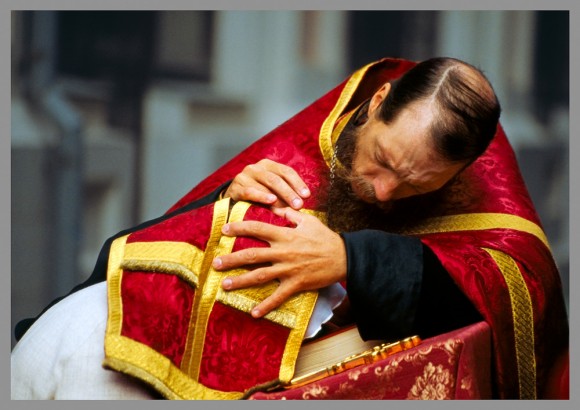
Photo by Dmitry Vsevolodovich, photosight.ru
Be on Your Guard!
I stand through the Rule, and recall my previous raptures. But my heart does not allow itself to be strained any further: there is no strength left. And there should not be! One needs to be reminded of one’s spiritual poverty. This repentant and peaceful contrition is the soul’s best guard against evil, against any possible incorrect deviations. Yes! Rapture – this is a heavenly visitor. But our earthly task is in “the sweat of our brows” to earn at least our “daily bread.” Being invited to the Royal trapeza does not depend upon us. Yes! Quiet repentance is our best “gift.” Things become much quieter with it, much quieter – and safer!
I know this exactly not only from experience, but also from the Holy Fathers.
“Rendering Them Powerless”
I have often wondered why, following the establishment of Christianity, it was necessary that for a full three hundred years there should above all be martyrs. The holy monks came after.
And now, before Nativity, we have the memory of martyrs, female martyrs, and monk-martyrs (and only a few monastic saints, such as St. Niphont on December 23). After the Nativity of Christ, on December 27, we have the Proto-martyr Archdeacon Stephen; then on December 28, the 20,000 (all in one day!) burned in Nicomedia in 302; and then on December 29, the 14,000 infants slain by Herod, and so forth and so on.
This is like a priceless necklace of precious stones on the icon of the Nativity of Christ, or like the nearest royal suite to the King.
The most important answer is now clear to me: the war waged by Emmanuel against the devil was later taken up by His warriors – male and female Christians. They took up arms against the “king of this world,” Satan, with all his malice and cunning. They defeated him with the power of the Lord Christ, but have not yet completely destroyed his kingdom: Christianity was first proclaimed as a tolerated religion, and then became the reigning one.
That is why we sing, in the common troparion to martyrs, that “with Thy strength they wiped out tyrants, and overcame demons, rendering them powerless.”
Moreover, martyrs are usually depicted on icons with a cross or a palm (one or the other). The cross is a symbol of Christ’s victory over hell; the palm is also a symbol of victory. Just as we meet Christ in His entrance into Jerusalem with palms as the “Conqueror… of the bitter kingdom” of death and hell, it becomes all the more obvious that the martyrs are successors of the “Coming One” in the battle with and victory over the devil. But then the decisive moment of the battle had already occurred. Now, at the Nativity, they are prophetically foreseen through the events of the death of the 14,000 infants, and afterwards by the Archdeacon Stephen and so on.
We need to know that for Christians the main battle is with a “broken enemy” – with demons. Ah! How often we forget this… and then we fall into their nets.
Our last battle will be at the tollhouses. O Lord, help us to free ourselves from the nets of the enemies, “lest mine enemy say: I have prevailed against him” (Prayer Before Sleep). One must pray. The Lord Himself said: Pray, that ye enter not into temptation (Matthew 26:41). But I pray very little – and, more significantly: slightly, superficially, and drily… only occasionally is it any different.
I Pray
This morning I came and read Midnight Office. Suddenly I had the thought: now I am praying. My God! How beautiful and important this is – for I am speaking “into the ear” of the Lord – His, truly His! I am speaking with Him. I am falling before Him. I am imploring Him. Is He, the Almighty, not capable of fulfilling my petition? (Granted, of course, that it is good and necessary.)
I say: “Have mercy on us” – and He has mercy on me. He hears this. He hath inclined His ear (Psalm 114:2). He is attentive unto my desires and prayers.
Can this remain completely without fruit? Not at all! The very prayer contains within itself its own fulfillment: to pray sincerely already means to receive. This gives joy to the soul – and this is not even to mention how immeasurably precious it is!
Here is Another Bride of Christ
Today is the feast day of St. Anastasia the Deliverer from Bondage. Yesterday was the virgin Juliana, and now is Anastasia, who was a virgin in marriage (she did not want to live with a husband in pagan marriage). This bride, like yesterday’s, says to her torturers at her interrogation: “I love martyrdom for my Beloved Christ.”
“I seek the Lord,” the Church sings along with her (third troparion of Ode III of the second canon).
“The Bridegroom of the Church”
We have just heard (and sung) these words during the Royal Hours (third troparion from the Ninth Hour).
I just thought of the betrothal of Christ with the Church on the Feast of the Circumcision. This is undoubtedly a true thought, for it is of the Church. In the troparion for female martyrs we sing: “O Jesus, Thy Lamb [name] crieth unto Thee exclaiming: ‘Thee, O my Bridegroom, do I love, and seeking Thee I endure Martyrdom… I die for Thee so that I may live with Thee.”
The images are taken from the book of the Song of Songs (3:1-4); because this book contains such brilliant images of the soul’s flaming love of God it was included in the canon of Scripture.
The Image in Images
I do not know how certain this is, but I just had the following thought during the service: Just how often the Church sees prototypes of the Savior everywhere – even in places where some historical person or event is spoken of, where everything could be explained as “natural history,” the Church sees a mystical meaning concerning the Lord. What is the reason for this association?
I have just had the following thought. The Lord was incarnate, becoming a man like everyone else in everything except sin. Adam was in Paradise initially without sin, but then fell. The Lord-Man, the New Adam, came without sin and demonstrated that the old Adam could have not fallen, for the New Adam was a man in all things. Consequently, life in all of us is one and the same. Therefore there is nothing harmful in such convergences. But there is another, deeper meaning: all that is good in every person belongs not to that person himself, but is united with Christ is the closest possible way.
How is this? After all, people are created in the image of God; and the image of God, the image of the Father, is Christ the Son of God. And what is an “image”? It is not a dead casting or a lifeless photograph, but there is something greater and more vital in that which is depicted. The Son of God is the Image of the Father – and this means that the Father lives in the Son. He that hath seen Me hath seen the Father (John 14:9); I and My Father are one (John 10:30); the Father is in Me, and I in Him (John 10:38).
Hence we will further conclude that if people are created in the image of the Image, then this image, the Son of God, lives in us. Everything that is luminous is His image in man. Inasmuch as the Son of God has been incarnate fully and “bodily” in the human form (icon, image), the following conclusion can be made: that which in the Old Testament was hidden of God in every person was openly revealed in the God-Man Christ. Therefore it is perfectly natural that these prototypes will have a relationship with the Image. Or it is even better to say that in the New Testament the very same Christ, the Image of God, was revealed that lived in people in the Old Testament.
Indeed, the Apostle Paul says of himself: yet not I, but Christ liveth in me (Galatians 2:20). This was hidden in the righteous ones and events of the Old Testament. The only difference is that in the New Testament this was openly revealed – the very “Truth” came, which in the Old Testament was only a “shadow,” as is sung: “The shadow of the Law is passed away with the coming of grace” (dogmatic of the second tone). Or again: “The truth hath come, the shadow hath passed away.”
After all, the power of a wonder-working icon (and, consequently, its very essence) is by no means its external resemblance to the face depicted on it, but rather in the power of the One Depicted – the Lord Himself or saints given grace by Him – communicated to the image. It follows that the Depicted One Himself is present in the icon. Therefore we look upon an icon and appeal to the one depicted as if living: “Most-Holy Theotokos! Holy Father Nicholas!” and so on.
Now the life of St. Niphont has been read at trapeza, relating how his Guardian Angel wept over the man assigned to him, who sinned with a harlot in his house. Asked why he was weeping, the Angel replied: “For in him (the fornicator) is the Image of God!”
The Angels’ Hymn
We all know it, but sometimes we explain its parts differently. For instance, in one sermon (in Sarug) I read the following explanation (in brief): Glory to God in heaven, and peace on earth, hope for people, and so on. But it is best of all to accept the Church’s explanation. I have just heard it in the hymnody, and therefore will write it out.
“Instead of myrrh,” let us bring forth “from the inner-chambers of our souls: Glory to God in the highest, Who existeth in Trinity! For His sake hath goodwill appeared among men delivering Adam from the primal curse, in that He loveth mankind” (first sticherion, Sixth Royal Hour).
This is not entirely clear [in Slavonic]. I would translate the second half like this: Goodwill (Himself) has appeared among men (that is, the Son of God the Mediator, on Whom the Father’s good will was shown), delivering Adam from the primal curse by His love for mankind. This could be translated variously, but in essence it remains the same. Namely: that everything is performed by the Most-Holy Trinity.
(May there be glory to the Trinity in Heaven, from Angels and men.)
The Mediator is the Man-Loving Christ, the Son of God. It is thanks to Him that the “good will” of the Trinity (this is the essence of the matter) has returned to the fallen world and removed the curse.
Consequently, the Church interprets the Angels’ hymn in the sense of the redemptive return of the previously lost good will of God.
This good will itself rested on the Incarnate Lord, and through Him onto His “relatives” according to the flesh, whose curse He took upon Himself and for which He suffered.
Therefore this “council” for the salvation of the world in the Holy Trinity is revealed in the Incarnate Son, on Whom was good will, and through Him this good will returned to people. Therefore in their souls they fully experience peace as reconciliation with God, peace as brotherly love, peace as a pacifying of the soul.
This same meaning can be derived from other hymns.
“Appropriating by Grace”
This place has also sunk into my soul. The Lord, it says in the service, came to “His own,” that is, to the Jews. And we “appropriate” Him through the grace of the Holy Spirit in the Mystery of Baptism and in other mysteries, and through all of the grace-filled life. Then I looked at this troparion (December 22, first troparion of Ode VI of the first canon) and saw how it continues: “through… virtues”; that means that this assimilates us to Christ. But according to the common patristic interpretation (and according to St. Seraphim), virtues are not only performed through the grace of the Holy Spirit but, more importantly, they are the path to our acquisition of it (“if he will keep our commandments, We will take up abode in his soul” (cf. John 14:23); but grace joins us together with Christ and forms the soul in the image of Christ. My God, my God! How far the modern world is from all this! Grace, He Who saves us from hell, the Destroyer of the curse, the good will of the Holy Trinity, virtue… It is all here! Politics, material culture, dances, and literary evenings with laughter… all that is over there. Christianity “is being driven out” of life.
It Undoubtedly Was
Everything that we live by is undoubted: for it was undoubtedly historical – obviously so. It happened! I experienced this during the service. Clearly, visually, irrefutably! This always helps to strengthen one’s faith. It gives joy. All of this, consequently, is real. I had already nearly forgotten about the occasion that elicited such an experience, but it is very clear and is preserved well and vividly in my soul. I began to understand why even St. Tikhon of Zadonsk felt it necessary in one of his sermons to speak of the obviousness of the revelation of the Son of God in the flesh. I will write it here: “Blessed be God, Who came to save sinners and to rescue the perishing. These treasures of salvation have been opened to us by eyewitnesses who saw Him, and heard Him, and spoke with Him, and lived and interacted with Him, who were associated with Him, and drank and ate with Him, and underwent afflictions with Him… These trustworthy and credible witnesses confirmed without doubt this Truth not only by their words, miracles, and various signs, but also by their blood, their various sufferings, and by their very death. Meditating on these things, brother Christian, learn from this, stand firm in this, take courage and strength; and the blasphemers and godless, of whom there are already more than a few, will be put to silence; and pray that we may love with all our hearts the God Who was revealed in the flesh for our sake but Whom we have not seen (cf. 1 Peter 1:8-9).”
In the middle of the day I read another chapter from the Divine Book of Acts. It is strikingly obvious! It is absolutely beyond doubt that it happened. It is an historical document, a church diary of the first days of Christianity.
Whoever wants to see the Church of Christ should read Acts. I am confident that no doubt will remain that it all undoubtedly took place.
And, consequently, that it still is.
And, consequently, that it is Truth Itself.
And, consequently, that one needs to live by this Truth.
And, consequently, that everything else in the world is important and valuable only to the extent that it is in agreement with the Divine Truth brought forth by the Incarnate One.
Forefeast Rumors
I have noticed that the pre-festal labors for the impending feast day greatly weaken the soul and dispel grace.
In particular, even writing festal letters removes the soul from the condition to which the Church leads it in its preparatory divine services and fasting. Even these very notes somehow interfere with it, distracting me from the most important thing: prayer and recollection of the soul. This can hurt a deeper acceptance of the feast’s grace. It is for good reason that St. Hesychius of Jerusalem wrote: “Let us take up prayer and humility, for it is with these two weapons that, along with sobriety, are as a fiery sword taken up by noetic warriors against the demons. If we will lead our lives in this way, then every day and hour we can mystically preserve the joyous feast day in our hearts.”
Conversely, if our hearts are concerned with rumors (with is the opposite of sobriety), then our souls will remain mundane and void of grace in the festal days.
I do not know how certain this is, but I just had the following thought during the service: Just how often the Church sees
Translated from Russian.












